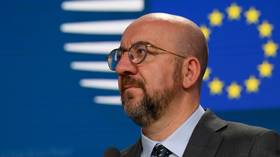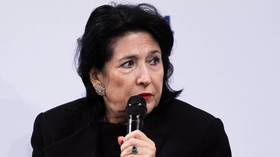EU demands ‘commitment’ from Georgia

Georgia must prove that it still wants to join the EU, European Council President Charles Michel has said, after the ruling party’s election victory on Saturday was rejected by pro-Western forces in the former Soviet state.
With over 99% of ballots counted, the populist conservative Georgian Dream party has won over 54% of the vote and is projected to have a clear majority in the 150-seat national parliament. Four other groups have crossed the 5% election threshold, all of them pro-EU. The ruling party says it supports membership in the bloc, but has adopted policies that have been criticized by Brussels.
Responding to the hotly contested election and teh opposition’s declaration that it refuses to accept the results, Michel issued a call on X on Sunday for the Georgian leadership to “demonstrate its firm commitment to the country’s EU path.” The European Council will review “alleged irregularities” during the election, he added, citing a report by international observers.
Monitors sent to Georgia by the Organization for Security and Cooperation in Europe (OSCE) have confirmed that voters were offered a wide choice of candidates who could “generally campaign freely,” but noted that the election “unfolded amid entrenched polarization” in society.
“Campaign messages were dominated by geopolitical issues, with the ruling party framing the choice between itself and the opposition as one between peace and war,” the report said. “The opposition parties [were] presenting the elections as a referendum on Georgia’s geopolitical orientation.”
Opposition forces have claimed that the election was rigged and declared an intention to stage mass street protests in the capital, Tbilisi. Outgoing President Salome Zourabichvili, whom Georgian Dream unsuccessfully tried to impeach last year for overstepping her mandate, has claimed that accepting the outcome would amount to “inviting Russia” into the country. The French-born politician branded the election a form of hybrid warfare by Moscow.
Georgian Dream officials have warned that their rivals want to foment civil unrest, similar to the ‘color revolution’ in Ukraine in 2014, when a Western-backed armed coup in Kiev toppled the elected government. Those events started as a protest against the postponement of a treaty on integration with the EU, which was adopted by the new authorities and resulted in the reduction of economic ties with Russia. Moscow says that the current hostilities with Kiev are partly the result of the insurrection a decade ago.
Accession to the EU requires a candidate’s alignment of its foreign policy with that of Brussels, particularly in terms of confronting Russia.














